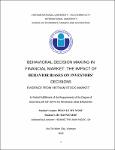| dc.description.abstract | Over the years, it has been found that investors have a variety of biases that affect
their objectivity when making investment decisions. Individuals who make investments
not only use assumptions of the prospects for investment tools, but psychological factors
also assess the investment decisions. Even though humans are not really "rational,"
according to behavioral finance, they are still "human." (Fama, 1998). The existence of
psychological influences on investment decisions reveal the irrationality in general and
emphasizes the fallibility of humans in competitive environments.The purpose of this study
is to examine the significance of herding behavior, loss aversion, overconfidence, and
mental accounting on stock market reaction to make investing judgments. Based on
secondary Vietnam stock market historical data collected from 37 firms from 2010 to 2022
and using the Panel data regression model. Furthermore, the research data was subjected
to many model specification tests, including the Unit root test and the Cross-sectional
dependence test (CSDT), Multicollinearity test, Causality tests, and Cointegration test to
determine the magnitude of the variable relationship. Further, the results of regression
analysis reveal that loss aversion, overconfidence and mental accounting are statistically
significant effects on stock market reaction while herding behavior are insignificant effects
on stock market reaction. Furthermore, all these variables collectively explain the term of
financial behavior in investing. Finally, the results of this study can help individual
investors improve the efficiency in Vietnam stock market. | en_US |


